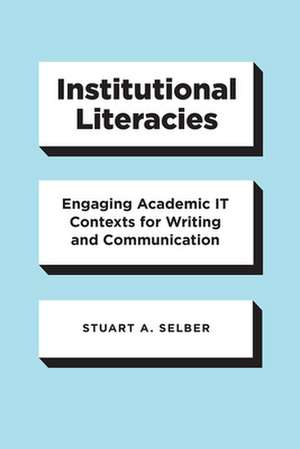Institutional Literacies: Engaging Academic IT Contexts for Writing and Communication
Autor Stuart A. Selberen Limba Engleză Hardback – 23 noi 2020
Institutional Literacies argues that writing and communication teachers and program directors should collaborate more closely and engage more deeply with IT staff as technology projects are planned, implemented, and expanded. Teachers need to both analyze how their institutions approach information technologies and intervene in productive ways as active university citizens with relevant expertise. To help them do so, the book offers a three-part heuristic, reflecting the reality that academic IT units are complex and multilayered, with historical, spatial, and textual dimensions. It discusses six ways teachers can intervene in the academic IT work of their own institutions: maintaining awareness, using systems and services, mediating for audiences, participating as user advocates, working as designers, and partnering as researchers. With these strategies in hand, educators can be proactive in helping institutional IT approaches align with the professional values and practices of writing and communication programs.
| Toate formatele și edițiile | Preț | Express |
|---|---|---|
| Paperback (1) | 297.32 lei 6-8 săpt. | |
| University of Chicago Press – 4 sep 2020 | 297.32 lei 6-8 săpt. | |
| Hardback (1) | 571.92 lei 6-8 săpt. | |
| University of Chicago Press – 23 noi 2020 | 571.92 lei 6-8 săpt. |
Preț: 571.92 lei
Preț vechi: 742.76 lei
-23% Nou
Puncte Express: 858
Preț estimativ în valută:
109.44€ • 113.08$ • 91.04£
109.44€ • 113.08$ • 91.04£
Carte tipărită la comandă
Livrare economică 19 martie-02 aprilie
Preluare comenzi: 021 569.72.76
Specificații
ISBN-13: 9780226699202
ISBN-10: 022669920X
Pagini: 272
Ilustrații: 5 tables, 2 line drawings
Dimensiuni: 152 x 229 x 20 mm
Greutate: 0.51 kg
Ediția:First Edition
Editura: University of Chicago Press
Colecția University of Chicago Press
ISBN-10: 022669920X
Pagini: 272
Ilustrații: 5 tables, 2 line drawings
Dimensiuni: 152 x 229 x 20 mm
Greutate: 0.51 kg
Ediția:First Edition
Editura: University of Chicago Press
Colecția University of Chicago Press
Notă biografică
Stuart A. Selber is associate professor in the Department of English at Pennsylvania State University, where he works as director of digital education and director of the Penn State Digital English Studio. His many books include Multiliteracies for a Digital Age and Solving Problems in Technical Communication, the latter also published by the University of Chicago Press.
Cuprins
Preface
1 Situating Academic IT
2 Historicizing Academic IT
3 Spatializing Academic IT
4 Textualizing Academic IT
5 Engaging Academic IT
References
Index
1 Situating Academic IT
2 Historicizing Academic IT
3 Spatializing Academic IT
4 Textualizing Academic IT
5 Engaging Academic IT
References
Index
Recenzii
“This book will inform a diverse array of readers and stakeholders on university campuses about the need to develop a set of literate practices to better understand the impact of technology on teaching and learning. Altogether, it is a phenomenal contribution to conversations in rhetoric and composition and beyond that, like so much of Selber’s work, will become canonical in a range of disciplines.”
"In arguing that writing and communication teachers should strategically engage with academic IT, Selber has done the field an important service, providing both grounds and methods for future pedagogical, administrative, and research projects that engage these powerful institutional entities."
"A must-read for a diverse array of readers, such as academic IT specialists, teachers, students, school administrators, university stakeholders, and all of those in academia who are increasingly spending more time online, relying more on IT resources, and contributing more content to digital environments."
"In conclusion, Selber’s Institutional Literacies expands our understanding of how academic IT units function to enable, constrain, and shape literacy practices. This understanding is particularly useful for teachers in the pandemic context that has significantly increased the need for online education as well as reliance on and collaboration with information technology for teaching and learning purposes."
